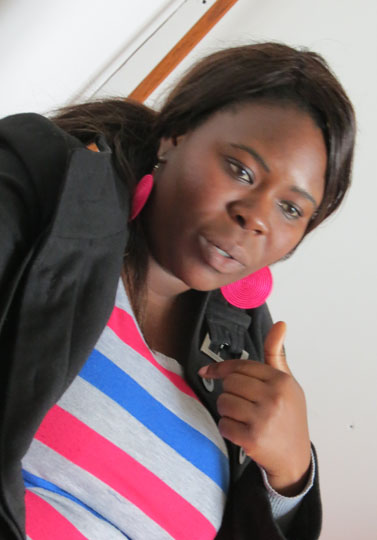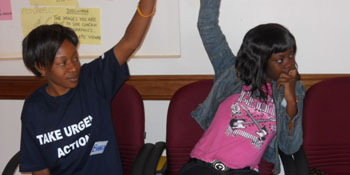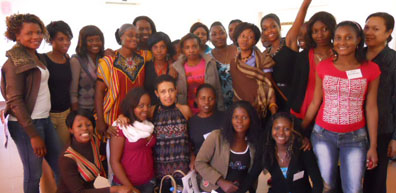Sexual and reproductive health rights (SRHR) are key issues for young women in Zambia.This year the constitution-making process provides a critical opportunity to put the debate on women’s bodies and choices around sexuality and abortion front and centre. In a context of staunch conservatism articulated by religious and traditional beliefs, there has been little progress on entrenching these rights. “Women in desperate circumstances will continue to seek backyard abortions and use herbs to attempt termination,” says JASS partner and Youth Vision Zambia Executive Director, Amos Mwale. “Meanwhile as we continue to debate, a lot of women continue to die from unsafe abortions in the townships, or from accessing the services of quacks.”
The current draft of the constitution, already in circulation for public comment, is seen as a step forward to provide the much needed protection for women’s rights especially in the repealing of Article 23 whose clauses (4, 5 and 7) allowed for discrimination against women on the basis of custom and traditional practices in areas of marriages, inheritance and death (burial rights). But there are some sections, such as the omission of LGBT rights and Article 28, which states that the right to life “begins at conception” that threaten reproductive health rights.
“It has become a very contentious issue whether young people can access these rights or whether there should be a limit to how much they can access…Zambia is a Christian nation so it is not easy to come out and say ‘let’s legalise abortion’. Young people out there are dying and it is a reality but then we decide to hide and say this is something that we are not going to legalise because of ‘social norms and moral standards.'” ~ Tsekai Makwelele Chityaba, Young Women in Action Programmes Officer.
 The impact of Article 28 is potentially huge for women, especially young women seeking contraception, information on safe sex and a range of reproductive health services. It will hinder the ability of women to access contraceptives which interfere with conception such as emergency contraceptive and intrauterine device. Nana Zulu Programme Coordinator of the Sexual and Reproductive Health and Rights at WLSA warns “In the long run if that article [28] is adopted – a lot of contraceptives would be outlawed, e.g. intrauterine device, emergency contraceptive, and furthermore it impacts on the issue of abortion, which already cannot be access on demand; this means the little service provided now will be taken away”. It also contravenes the Termination of Pregnancy Act (1972) which provides for safe abortion under certain circumstances. In the current draft there is a clause which would mean Article 28 would supersede existing law and render certain reproductive health services unconstitutional.
The impact of Article 28 is potentially huge for women, especially young women seeking contraception, information on safe sex and a range of reproductive health services. It will hinder the ability of women to access contraceptives which interfere with conception such as emergency contraceptive and intrauterine device. Nana Zulu Programme Coordinator of the Sexual and Reproductive Health and Rights at WLSA warns “In the long run if that article [28] is adopted – a lot of contraceptives would be outlawed, e.g. intrauterine device, emergency contraceptive, and furthermore it impacts on the issue of abortion, which already cannot be access on demand; this means the little service provided now will be taken away”. It also contravenes the Termination of Pregnancy Act (1972) which provides for safe abortion under certain circumstances. In the current draft there is a clause which would mean Article 28 would supersede existing law and render certain reproductive health services unconstitutional.
Under the banner of the Non-governmental Organisations Co-ordinating Council for Gender and Development (NGOCC), women in Zambia have spoken out on the draft constitution. They have raised critical issues including the need to guarantee women’s political participation and enshrine women’s economic rights and protection against gender based violence in the women’s declaration on engendering the constitution (Women’s Mulungushi Declaration 2012 on Engendering the Republican Constitution). Women activists have also formulated a mobilisation plan to ensure women’s voices are heard (Mobilisation Plan for the Inclusion of women’s constitutional rights). Despite intense debate and strong lobbies from both pro-life and pro-choice groups, in the end the Mulungushi statement fails to address SRHR.

Zulu says the women’s movement is pleased with some of the rights contained in the constitution but notes “the women’s movement is not homogenous and particular groups are not on the same page in regard to Article 28”. It’s clear that less controversial goals like women’s equal political representation are easier to put on the table and gain consensus. It is much harder to forefront issues that go to the heart of women’s bodily autonomy and for the voices of young women to be heard. But women continue to be determined and mobilise in their struggle for SRHR for all women.
“We are dealing with some strong [pro-life] lobbies – anti-contraception, anti-abortion and anti-women making decisions over their own bodies. This is not to say we will lie down and not do anything, simply there is a challenge and we need to step up and deal with it.” ~ Eugenia Temba of Equality Now


























